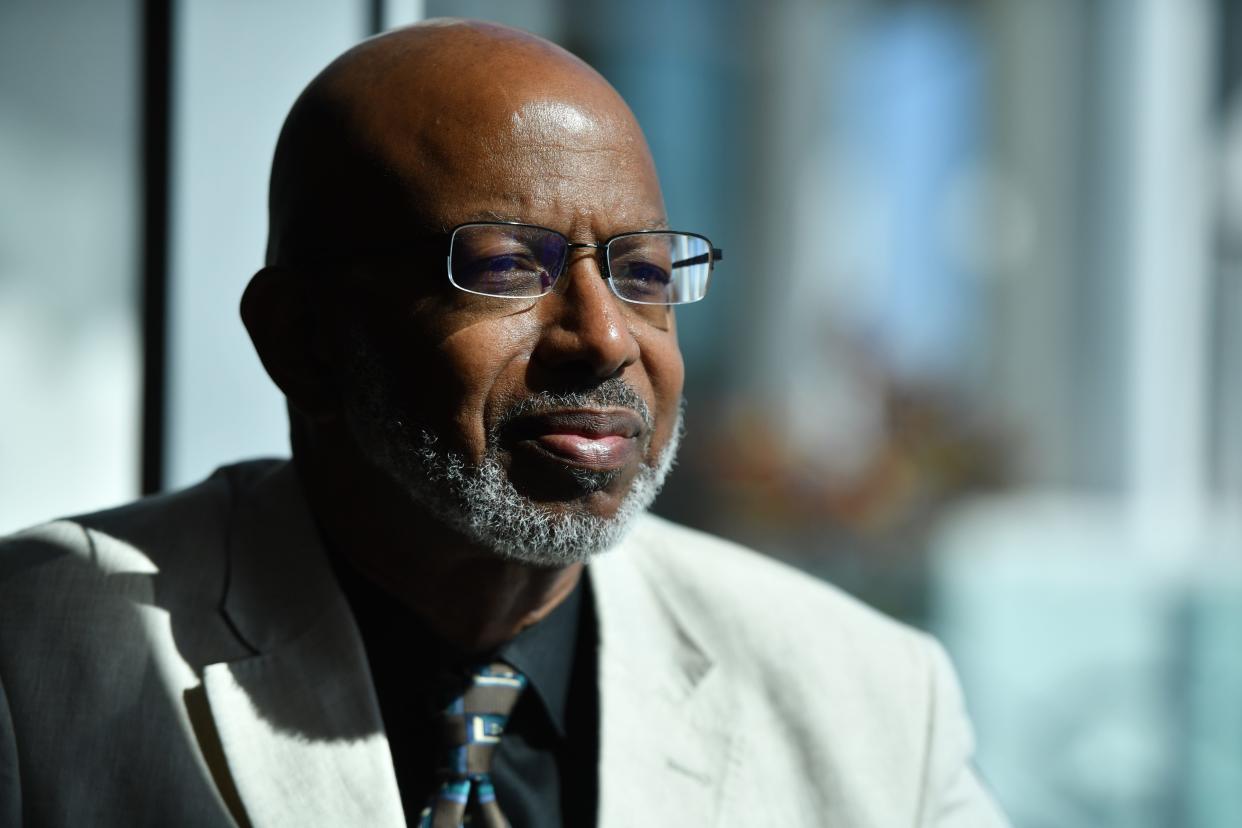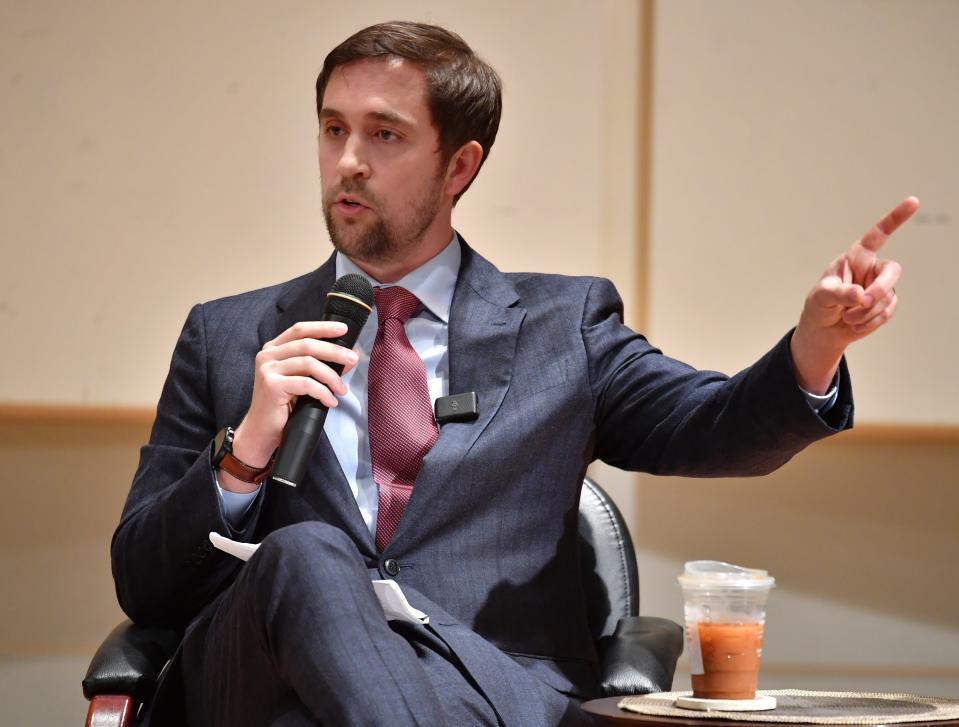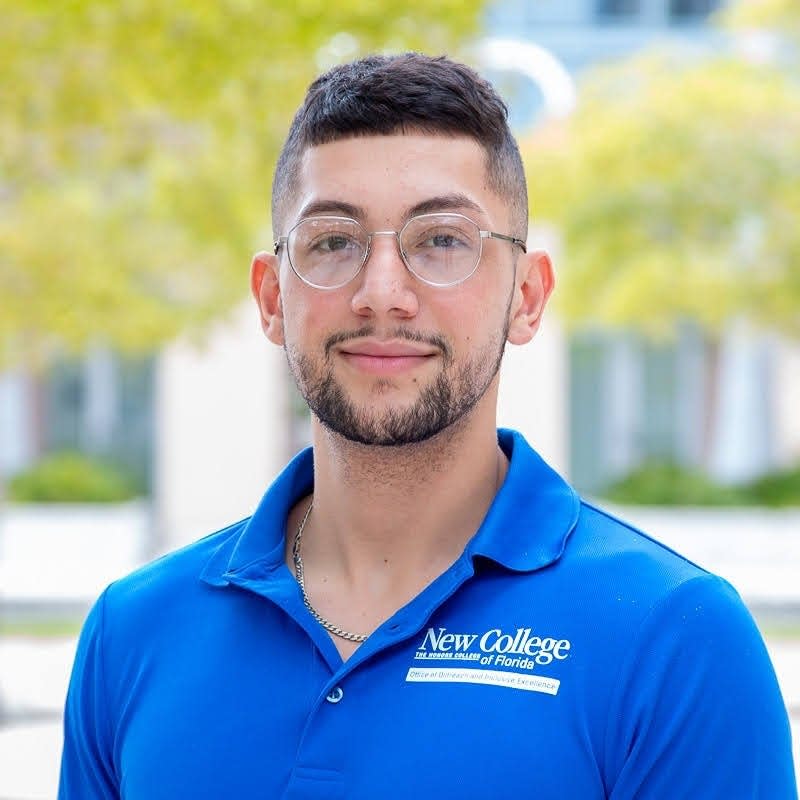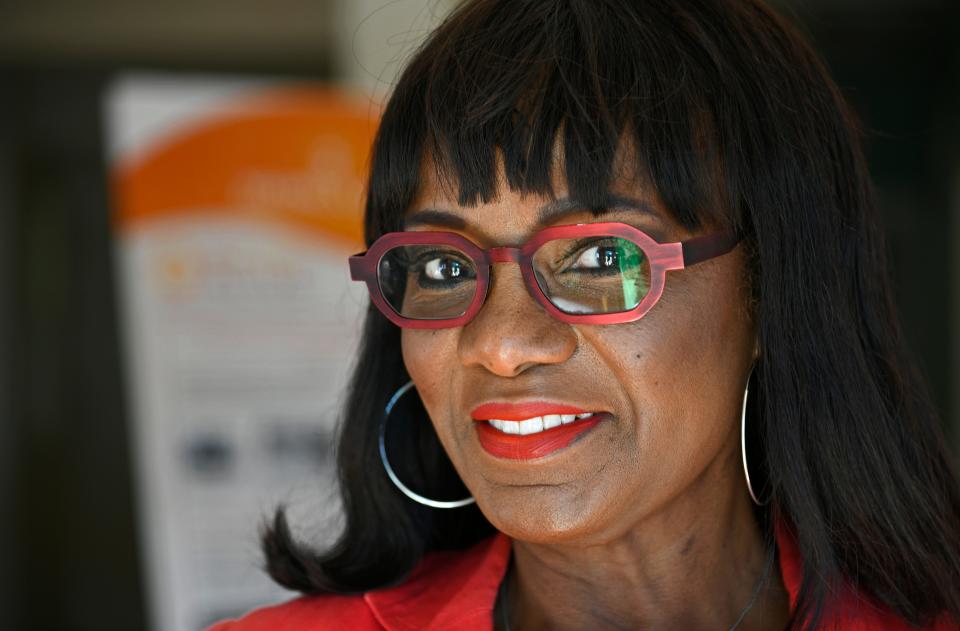New College wants to become more diverse, but DeSantis' board appointees stand in the way

- Oops!Something went wrong.Please try again later.
The Potomac School was founded in Washington, D.C., in 1904, and when Bill Woodson arrived as a fourth-grader in the 1960s he was among the first wave of Black students to attend.
Woodson took a job at New College of Florida in 2019, and by that time educational institutions had made big strides in increasing minority representation.
Yet New College had just 25 Black undergraduates – 3.3% of the student body − when Woodson was hired as the school’s chief diversity officer.
The college long has been overwhelmingly white.
25 days that shook New College: How Ron DeSantis swiftly transformed the Sarasota school
Major shakeup: New College board fires president, installs former GOP House speaker, DeSantis ally
When Woodson started, 69.3% of New College undergraduates were white, compared to a student body at the University of Florida that was 52.3% white.
New College hired Woodson to work on making the college more diverse, more welcoming to the minority population already there and more engaged in the broader community. He created the college’s Office of Outreach and Inclusive Excellence, which oversees diversity, equity and inclusion (DEI) programs.
Since then, DEI has come under intense criticism from many conservatives, who oppose taking racial considerations and other diversity issues into account when designing everything from college recruitment efforts to curriculum.
New College has become ground zero in this battle after Gov. Ron DeSantis appointed six new board members in an effort to reshape the school as a model for conservative ideas about higher education.
Christopher Rufo leads attack
Among those new board members is conservative activist Christopher Rufo, who has made it his mission to dismantle DEI programs.
“Public university DEI programs promote racialist ideology, engage in discriminatory hiring, push left-wing loyalty oaths, infringe on freedom of speech, practice racial pseudoscience, and waste taxpayer money,” Rufo wrote on Twitter this week. “Abolish them now.”

Rufo’s first motion as a new board member last month was to abolish New College’s Office of Outreach and Inclusive Excellence, fire its four employees, prohibit diversity training and rewrite college policies to remove DEI language.
Aside from it not being “a good look” for a group of new trustees who are all white and mostly male to eliminate an office staffed by four individuals who are mostly minorities and female, Woodson said abolishing the office will set back the school’s efforts on a variety of fronts. It also could have unintended consequences, some of which gave trustees pause when they were raised by holdover members of the board.
"As a small college people have five and six jobs, they are doing a bunch of things, there are contracts and grants and other things," said board member Mary Ruiz, who worried that eliminating the office would impact activities that are "irrelevant" to the debate over diversity policies.
Rufo’s motion was revised to delay final action until later this month.
The board will meet again on Feb. 28 to discuss the office's fate.
Woodson is moving on, having taken a new job before DeSantis' transformation effort began at New College, but he is proud of the work he did at Florida's liberal arts honors college over the last four years and hopes the new trustees will reconsider their plan to eliminate the office he created.
Diversity champion
Woodson was born in Sarasota but grew up in Washington, D.C. He received a bachelor's degree from Brown University, a master’s from Harvard, an MBA from the University of Michigan and a Ph.D. from the University of Minnesota before embarking on a career that included positions at three Fortunate 500 companies.
Woodson’s interest in diversity issues began when he got involved in college recruiting for pharmaceutical giant Johnson & Johnson.
After leaving the corporate world, Woodson worked as an assistant dean for MBA programs and outreach at the University of St. Thomas in Minnesota. He responded to a New College job posting in 2018, becoming the school’s first chief diversity officer and dean of outreach in early 2019.
“It was an exciting opportunity; the mission of New College was really appealing to me,” Woodson said.
Woodson viewed his job as helping New College “fully realize itself” by addressing some of the school’s “gaps.”
In case you missed it: DeSantis wants $10 million in recurring funding for New College transformation
And: Latest New College board appointment gives conservatives a majority
Those gaps included "a real absence of diversity, particularly African American diversity… and then also a lack of strong purposeful ties with the community,” he said.
Among the programs Woodson implemented was a "guaranteed admission" program for students who met minimum grade point average, standardized test score and course requirements. Among the seven local schools where students are offered guaranteed admission is Booker High School, which has a large minority student population.
With roughly 700 students, New College is small even by the standards of small liberal arts colleges. There has long been a push to grow the student body.
Woodson believes that making the college more welcoming to diverse groups will help that growth. That means not just targeting minority students, but other underrepresented populations.
New College is heavily female. Trying to understand why the college isn’t attracting more male students also is something Woodson views as an important diversity issue, along with supporting low-income students.
Woodson’s office helps low-income students through a $500,000 grant from the Barancik Foundation. More than 30 Barancik Scholars already have received at least $200,000 in financial support to help with a range of expenses.
Woodson also set about trying to support some of the minority staff members working at New College, which has experienced problems with staff retention, he said. He conducted an informal count and found more than a dozen minority staff members left in recent years.
A voluntary training program attended by 70% of staff aimed to help them understand how to “more effectively collaborate with people who are different from myself,” he said.
Diego Villada, a professor of theatre and performance studies at New College who is the child of Colombian immigrants, said he found the training helpful.
"When they do a training and they invite professors to think about how their language can be more inclusive I don't see that as like oppressive in some way. I see that as me seeking out resources that can help me teach better," he said.
Villada opposes the push to abolish New College's Office of Outreach and Inclusive Excellence and target diversity, equity and inclusion programs.
“We are not indoctrinating anyone and DEI helps us to be more conscious and intentional about welcoming and respecting our students," he said.
Groundwork laid
The minority population at New College hasn't changed much since the Office of Outreach and Inclusive Excellence was established, but Woodson believes the groundwork has been laid for growth.
In the fall of 2018, shortly before Woodson arrived at New College, the undergraduate population was 69% white, 17.3% Hispanic, 3.3% Asian and 3.3% Black.
In the fall of 2022, New College's undergraduate study body was 64.6% white, 17% Hispanic, 4.2% Asian and 4% Black. The school went from having 25 Black undergraduates in 2018, to 27 in 2022.
"It really hasn’t changed much," Woodson said.
More previous coverage: New era at New College kicks off with contentious meetings, report of death threat
Yet he believes the office is poised to have a significant impact.
“I think we’re positioned for that growth up until this point,” he said. “Now, what happens going forward is going to be interesting, especially if the office is not allowed to continue to do the work that it’s doing.”
Asked if having a racially/ethnically diverse student body should be a goal for New College and whether eliminating the Office of Outreach and Inclusive Excellence could setback those efforts, new trustee Mark Bauerlein, who was appointed by DeSantis, pointed to the many ways that diversity can be measured as a reason not to engage in any diversity efforts.
"If you want to dive into numbers on this... what would you say about the male-female ratio of New College? How about the distribution of students by family income? And what about the LGBTQ population at New College — is it proportional to the US population as a whole?" Bauerlein asked.
"This is the problem of starting to do the equity thing. Select one group for proportionality, and you have to select many more," he added. "So, in principle, I am opposed to all such maneuvering at the higher Ed level."
Steven Keshishian’s experience as a minority student at New College is that the school “aspired to be an inclusive and welcoming place,” but struggled to diversify for a variety of reasons.
“The stats speak for themselves; the institution was a predominantly white institution and continues to be one,” he said.

Keshishian is of Vietnamese and Lebanese dissent. He became student body president and served as the student member of the board of trustees during a period when the Office of Outreach and Inclusive Excellence was just getting started. He believes in the office’s mission.
“It’s not radical at all, it’s inclusion 101,” said Keshishian, who graduated in 2021 and now serves as a second lieutenant in the U.S. Army.
Community outreach
In addition to promoting diversity, the Office of Outreach and Inclusive Excellence also works to help strengthen the ties between New College and the broader region.
New College was founded in 1960 and has a history of community engagement in Sarasota and Manatee counties, but such efforts have been “episodic,” Woodson said.
The college secured a $750,000 grant from the Mellon Foundation to develop a more sustained community outreach program.
New board member on his assignment: 'Lead New College of Florida out of wokeness'
New College board member's Twitter: Feed full of COVID conspiracies and climate-change denial
The grant is managed by the Office of Outreach and Inclusive Excellence. It’s goal is “to foster a deeper understanding of the arts and humanities” through efforts that engage the broader community, according to the college’s website.
The money also pays for programs targeted at “the preservation of local history, integration of social and racial justice work into artistic practice and teaching, and exploration of questions of special interest to the local community.”
The grant is funding two upcoming events focused on the Amish, including Sarasota’s Pinecraft community. It also is paying for a course developed by anthropology professor Uzi Baram, who is partnering with Vickie Oldham, the president and CEO of the Sarasota African American Cultural Coalition.
Oldham is working to open an African American cultural center and history museum, an extension of her “Newtown Alive” initiative, which documented the history of Sarasota’s historically African American neighborhood.

New College students will help develop displays for the new museum, drawing on “oral history, anthropology, museum studies and African American heritage studies,” according to a course description.
Oldham said the community connections that the Office of Outreach and Inclusive Excellence is fostering are important.
She partnered with a New College student who was studying statistics to conduct community surveys on what Newtown residents wanted from the new museum. The student then created a report that helped guide the project.
New College’s connection to Newtown goes back to the 1960s, she noted. New College students helped run “freedom schools” set up in local churches in 1969 to educate Black children, who were boycotting their public schools in Newtown to protest a plan to close them.
“Newtown and New College have a rich history together,” Oldham said. “Saying you’re getting rid of diversity means you’re getting rid of Newtown’s participation in New College.”
Oldham is alarmed by the broader targeting of diversity initiatives in Florida.
DeSantis is pushing to strip universities throughout Florida of their diversity, equity and inclusion programs.
“Diversity and inclusion and equity is what makes us beautiful,” Oldham said.
Oldham and Woodson participated in a panel discussion recently at the Sarasota Yacht Club focused on racial justice.
Woodson said Sarasota is “at a crossroads.”
“The barriers are still there to be broken,” he said. “Yesterday, we could slip right back to that in a moment if we’re not careful.”
This article originally appeared on Sarasota Herald-Tribune: Florida college ground zero in DeSantis pushback on diversity efforts

